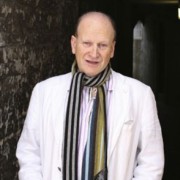How did you find the transition from theatre critic to playwright?
Very strange. After I’d given up reviewing and went to the theatre as an ordinary human being, sometimes on first nights I felt as if I were dead and had come back to life on a visit, floating around as a ghost…
The transition from critic to playwright had obviously started before I left the Evening Standard. It felt good to be leading a double life. But then when I stopped reviewing, I was out there on my own and I felt the odd long-distance loneliness of the writer very strongly. Theatre reviewing isn’t a particularly sociable trade but I believed I was part of an almost daily process. It’s addictive, I think; coming to the excitement, or sometimes the disaster, of the new, three or four times a week.
When working as a critic, you were famous for your acerbic reviews. Are you able to apply the same level of scrutiny to your own work when writing?
When I read what I’ve written, the writing self is overtaken by the critical self and I start criticising and sometimes despising what I’ve done. I keep meddling with the pages I’ve done and won’t leave things alone; there’s always a rigorous critic looking over my shoulder. I write and rewrite. And I’m fairly scathing when someone speaks to me about what I’ve produced — that’s not to say I’m never pleased with the finished article.
Your debut play, Plague Over England, received glowing reviews and a transfer to the West End. Did this help to validate you as a playwright?
I was amazed and dazed with delight and shock. But there were some people who made it clear that they were angered at what had happened and demonstrated their unhappiness at my good luck. There was even one critic who published a piece about his resentment; that I and the play had received so much publicity — it was as if he felt I had orchestrated the whole thing. I didn’t feel particularly validated though.
The play is set in Spain. Where is your favourite holiday destination?
Venice, and bits of Italy — and of course Spain.
The Unquiet Grave of Garcia Lorca is set at the time of the Spanish civil war. To what extent would you argue that, aside from focusing on Lorca and his young lover, the play offers a wider criticism of the politics at the time?
I’d argue that the play is entirely political. Lorca and his young lover are not just victims of the fascists, but also of Britain’s betrayal of Spain. I tried to convey a sense of the times. The appeasing British government, terrified of Russia and Bolshevism, rather than Hitler and Mussolini; with quite a number of Tory MPs keen on fascism and anti-semitism, leaned on France not to send arms to the Republican government and encouraged France’s suggestion of a non intervention pact for European countries in terms of the Spanish civil war.
Italy and Germany agreed to sign but in the weeks before doing so they sent arms supplies to Franco. Britain averted its gaze. This policy of appeasing helped convince Hitler the UK was a soft touch. It was a poor decision — Britain had to pay the price for ensuring they could pass through Gibraltar when the WWII began.
Associates of M16 were in cahoots with Spanish fascists even before the war, helping to supply the British plane that took Franco from the Canary Islands to Spanish Morocco to collect the troops loyal to him.
The Unquiet Grave of Garcia Lorca crosses time zones between London and Spain; what challenges did this present when writing the play?
Huge ones. The idea for the play came to me when I read about a very old Spanish art and architecture critic, who in 2011, had given his sister a box of papers and diaries to be made public after he died. When opened, these papers revealed that he’d been Lorca’s last and secret lover, at the age of 19. I wanted to relate the present to that past, in terms of concealment of gay identity. Might a young Englishman in 1936 have behaved as Lorca’s young lover had at the same time?
At the end of a long day, what’s your favourite meal to sit back with and enjoy?
I can’t say that I have a favourite meal. I’m very childish. In an ideal world I would only eat desserts; a world of ice-creams. I do adore gazpacho, though and pasta.
What was it about Garcia Lorca’s story that influenced you to write the play?
The horror of it. He was a politically unsophisticated, mildly left wing humanitarian — not one of those communists who were betes noires to Franco’s nationalists. Yet there he was in his parent’s home, picked up in a police raid, taken away, probably sexually tortured and after three days, taken away and shot. Somehow the killing and the cruelty resounds and resounds with me.
Who are you trying to reach with Lorca’s story?
Human beings and homophobes.
In your previous work, you’ve addressed issues affecting the gay community and have interviewed gay artists at a time when it was taboo to do so. Do you consider yourself to be an activist?
In a sense I did consider myself an activist during my time at the Guardian, in days when gay rights were given the cold shoulder and AIDS was inciting violent homophobia. I did quite a bit behind the scenes for the cause. The Guardian wasn’t very keen on gay issues and I was the only gay man around, as far as I knew. I was the arts correspondent and the arts editors were far more sympathetic. So I interviewed quite a lot of gay people for them. I picked up gay stories that no one else would touch.
I would have liked to go on making a contribution but sadly it never happened so I faded out of that world, though I went on writing gay-related articles at the Standard when I could. Derek Jarman was a friend of mine and I was delighted to give him the chance to talk about his films and let people appreciate his stoic, inspiring bravery in the face of AIDS. He never lost his determination to carry on making films while contending with an AIDS-related illness. What an amazing man he was.
Apart from the theatre, how else do you like to spend your time?
I like gardening, the sun and movies.
Do you find it difficult to detach yourself from the characters of the play when writing?
Very. I dreaded writing the final sequences of the play when Lorca is told he will be shot before dawn. Then I reminded myself there was some posthumous happiness to be found in the telling of the story. Lorca dies, but he lives in the sense that his poetry and plays survive and are admired across the civilised world while the barbaric Franco is reviled; except by fascists.
Writing is often seen as form of self therapy — have you found this to be true?
Yes. Very much so.
Have you seen a change in the way that people approach you, now that your critic days are behind you?
I don’t really know. Far fewer people approach me now, but those who do are far nicer and say flattering things.
What are your ambitions for the future?
To live in a state of happiness that surprises me.













